自动化专业英语8.ppt
- 格式:ppt
- 大小:128.00 KB
- 文档页数:20
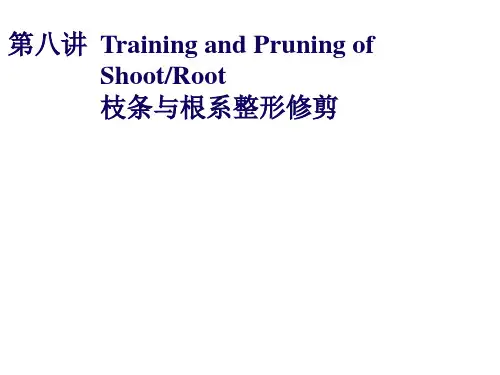

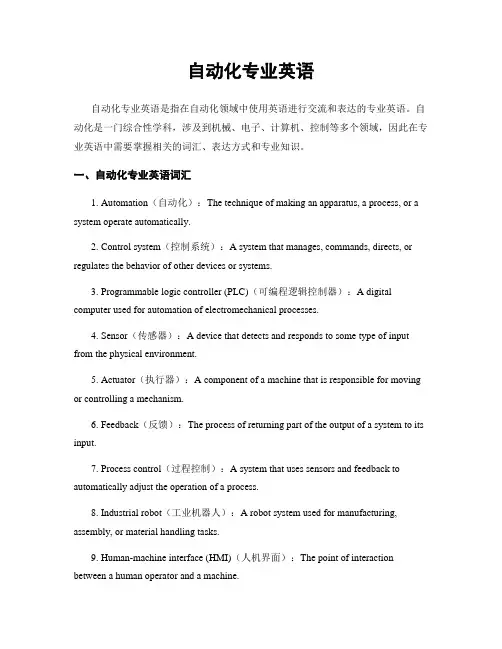
自动化专业英语自动化专业英语是指在自动化领域中使用英语进行交流和表达的专业英语。
自动化是一门综合性学科,涉及到机械、电子、计算机、控制等多个领域,因此在专业英语中需要掌握相关的词汇、表达方式和专业知识。
一、自动化专业英语词汇1. Automation(自动化):The technique of making an apparatus, a process, or a system operate automatically.2. Control system(控制系统):A system that manages, commands, directs, or regulates the behavior of other devices or systems.3. Programmable logic controller (PLC)(可编程逻辑控制器):A digital computer used for automation of electromechanical processes.4. Sensor(传感器):A device that detects and responds to some type of input from the physical environment.5. Actuator(执行器):A component of a machine that is responsible for moving or controlling a mechanism.6. Feedback(反馈):The process of returning part of the output of a system to its input.7. Process control(过程控制):A system that uses sensors and feedback to automatically adjust the operation of a process.8. Industrial robot(工业机器人):A robot system used for manufacturing, assembly, or material handling tasks.9. Human-machine interface (HMI)(人机界面):The point of interaction between a human operator and a machine.10. SCADA (Supervisory Control and Data Acquisition)(监控与数据采集系统):A system for remote monitoring and control of industrial processes.二、自动化专业英语表达方式1. Describing a process(描述过程):To begin with, the raw materials are fed into the production line. Then, the sensors detect the input and send signals to the control system. The control system processes the signals and adjusts the parameters of the actuators accordingly. This ensures that the production process is carried out smoothly and efficiently.2. Explaining a control system(解释控制系统):A control system consists of several components, including sensors, actuators, and a programmable logic controller (PLC). The sensors detect the input from the environment and send signals to the PLC. The PLC processes the signals and sends commands to the actuators. The actuators then move or control the mechanism based on the commands received. This allows the control system to regulate and maintain the desired behavior of the system.3. Discussing the importance of automation(讨论自动化的重要性):Automation plays a crucial role in various industries. It improves efficiency, reduces human error, and increases productivity. By automating repetitive tasks, companies can save time and resources. Moreover, automation enables real-time monitoring and controlof processes, leading to better quality control and higher safety levels. In addition, automation allows for flexibility and scalability, as systems can be easily reprogrammedor reconfigured to adapt to changing requirements.4. Presenting the benefits of using industrial robots(介绍使用工业机器人的好处):Industrial robots have revolutionized manufacturing processes. They can perform repetitive tasks with high precision and speed, resulting in increased productivity.Furthermore, robots can operate in hazardous environments, reducing the risk to human workers. With their ability to handle heavy loads and work for extended periods, robots contribute to cost savings and improved efficiency. Additionally, robots can be programmed to perform complex tasks, such as assembly or welding, with minimal errors.三、自动化专业英语专业知识1. PID control(PID控制):A control technique used in feedback control systems. It calculates an error value as the difference between the desired setpoint and the measured process variable. The control algorithm adjusts the output based on proportional, integral, and derivative terms to minimize the error and achieve stable control.2. Robotics(机器人技术):The branch of engineering and science that deals with the design, construction, operation, and application of robots. It encompasses mechanical engineering, electrical engineering, computer science, and artificial intelligence.3. PLC programming(PLC编程):The process of creating a set of instructions for a programmable logic controller. It involves defining input and output signals, designing the control logic, and implementing the desired functionality.4. HMI design(人机界面设计):The process of creating an interface between a human operator and a machine. It involves designing user-friendly screens, buttons, and menus to facilitate interaction and control.5. SCADA system architecture(SCADA系统架构):The structure and components of a supervisory control and data acquisition system. It typically consists of a human-machine interface, remote terminal units, communication networks, and a central control station.以上是关于自动化专业英语的标准格式文本,涵盖了词汇、表达方式和专业知识。
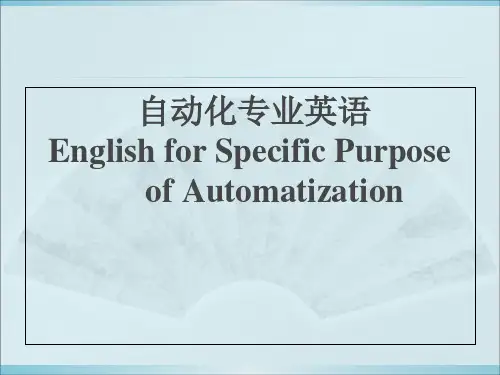
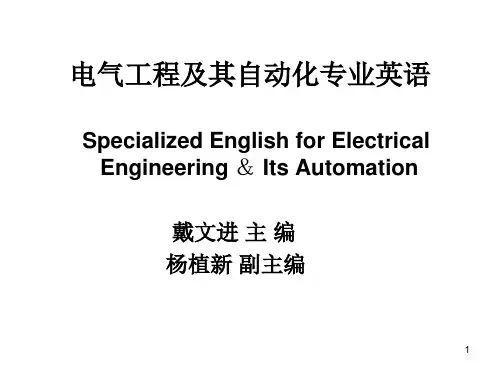
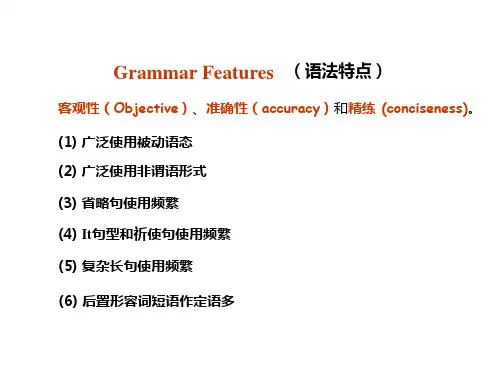
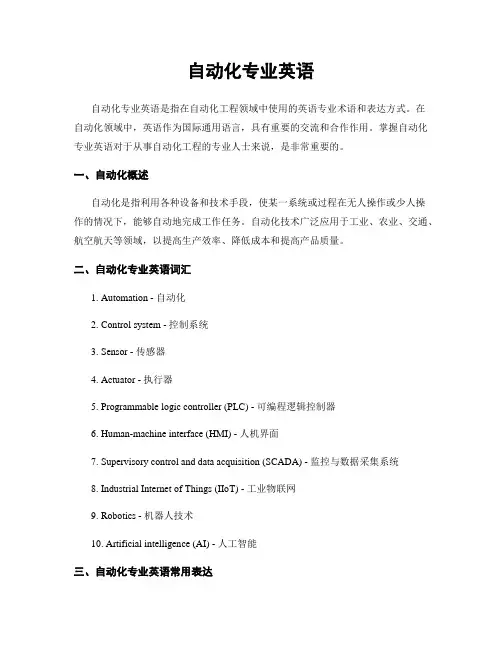
自动化专业英语自动化专业英语是指在自动化工程领域中使用的英语专业术语和表达方式。
在自动化领域中,英语作为国际通用语言,具有重要的交流和合作作用。
掌握自动化专业英语对于从事自动化工程的专业人士来说,是非常重要的。
一、自动化概述自动化是指利用各种设备和技术手段,使某一系统或过程在无人操作或少人操作的情况下,能够自动地完成工作任务。
自动化技术广泛应用于工业、农业、交通、航空航天等领域,以提高生产效率、降低成本和提高产品质量。
二、自动化专业英语词汇1. Automation - 自动化2. Control system - 控制系统3. Sensor - 传感器4. Actuator - 执行器5. Programmable logic controller (PLC) - 可编程逻辑控制器6. Human-machine interface (HMI) - 人机界面7. Supervisory control and data acquisition (SCADA) - 监控与数据采集系统8. Industrial Internet of Things (IIoT) - 工业物联网9. Robotics - 机器人技术10. Artificial intelligence (AI) - 人工智能三、自动化专业英语常用表达1. The automation industry is rapidly growing. - 自动化行业发展迅速。
2. The control system regulates the operation of the machinery. - 控制系统调节机械的运行。
3. The sensor detects changes in temperature. - 传感器检测温度变化。
4. The actuator moves the robotic arm. - 执行器移动机械臂。
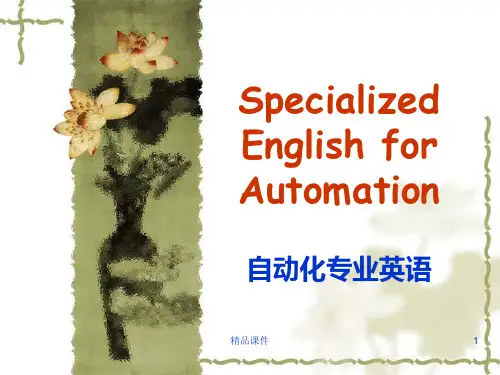
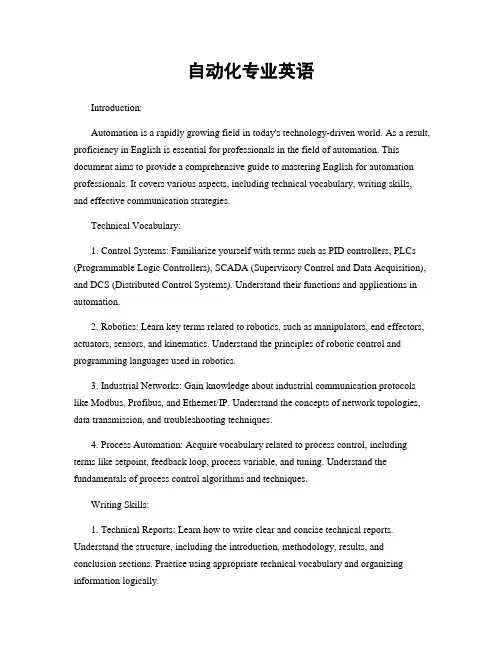
自动化专业英语Introduction:Automation is a rapidly growing field in today's technology-driven world. As a result, proficiency in English is essential for professionals in the field of automation. This document aims to provide a comprehensive guide to mastering English for automation professionals. It covers various aspects, including technical vocabulary, writing skills, and effective communication strategies.Technical Vocabulary:1. Control Systems: Familiarize yourself with terms such as PID controllers, PLCs (Programmable Logic Controllers), SCADA (Supervisory Control and Data Acquisition), and DCS (Distributed Control Systems). Understand their functions and applications in automation.2. Robotics: Learn key terms related to robotics, such as manipulators, end effectors, actuators, sensors, and kinematics. Understand the principles of robotic control and programming languages used in robotics.3. Industrial Networks: Gain knowledge about industrial communication protocols like Modbus, Profibus, and Ethernet/IP. Understand the concepts of network topologies, data transmission, and troubleshooting techniques.4. Process Automation: Acquire vocabulary related to process control, including terms like setpoint, feedback loop, process variable, and tuning. Understand the fundamentals of process control algorithms and techniques.Writing Skills:1. Technical Reports: Learn how to write clear and concise technical reports. Understand the structure, including the introduction, methodology, results, and conclusion sections. Practice using appropriate technical vocabulary and organizing information logically.2. Documentation: Develop skills in creating user manuals, installation guides, and maintenance documentation for automation systems. Focus on providing accurate and detailed instructions, using diagrams and illustrations where necessary.3. Email Communication: Master the art of writing professional emails. Use a formal tone, concise language, and proper grammar. Clearly state the purpose of the email and provide all necessary information. Practice effective email etiquette, including proper greetings and closing remarks.Effective Communication Strategies:1. Presentations: Develop skills in delivering effective presentations. Organize your content logically and use visual aids to enhance understanding. Practice using appropriate body language, voice modulation, and engaging the audience.2. Active Listening: Enhance your listening skills to understand client requirements, project specifications, and feedback. Pay attention to details, ask clarifying questions, and confirm understanding to avoid misunderstandings.3. Teamwork and Collaboration: Learn to effectively communicate and collaborate with colleagues and team members. Practice active participation, sharing ideas, and resolving conflicts constructively. Develop skills in giving and receiving constructive feedback.Conclusion:Mastering English in the field of automation is crucial for professionals to excel in their careers. This comprehensive guide has provided an overview of technical vocabulary, writing skills, and effective communication strategies. By continuously practicing and improving these skills, automation professionals can enhance their professional growth and contribute to the advancement of the industry.。
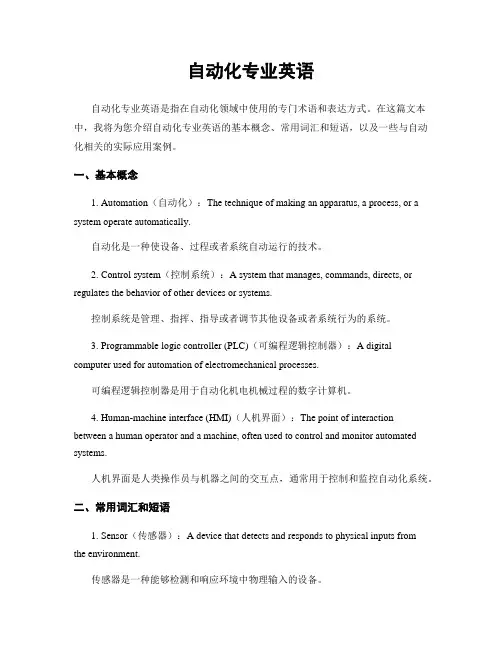
自动化专业英语自动化专业英语是指在自动化领域中使用的专门术语和表达方式。
在这篇文本中,我将为您介绍自动化专业英语的基本概念、常用词汇和短语,以及一些与自动化相关的实际应用案例。
一、基本概念1. Automation(自动化):The technique of making an apparatus, a process, or a system operate automatically.自动化是一种使设备、过程或者系统自动运行的技术。
2. Control system(控制系统):A system that manages, commands, directs, or regulates the behavior of other devices or systems.控制系统是管理、指挥、指导或者调节其他设备或者系统行为的系统。
3. Programmable logic controller (PLC)(可编程逻辑控制器):A digital computer used for automation of electromechanical processes.可编程逻辑控制器是用于自动化机电机械过程的数字计算机。
4. Human-machine interface (HMI)(人机界面):The point of interaction between a human operator and a machine, often used to control and monitor automated systems.人机界面是人类操作员与机器之间的交互点,通常用于控制和监控自动化系统。
二、常用词汇和短语1. Sensor(传感器):A device that detects and responds to physical inputs fromthe environment.传感器是一种能够检测和响应环境中物理输入的设备。
